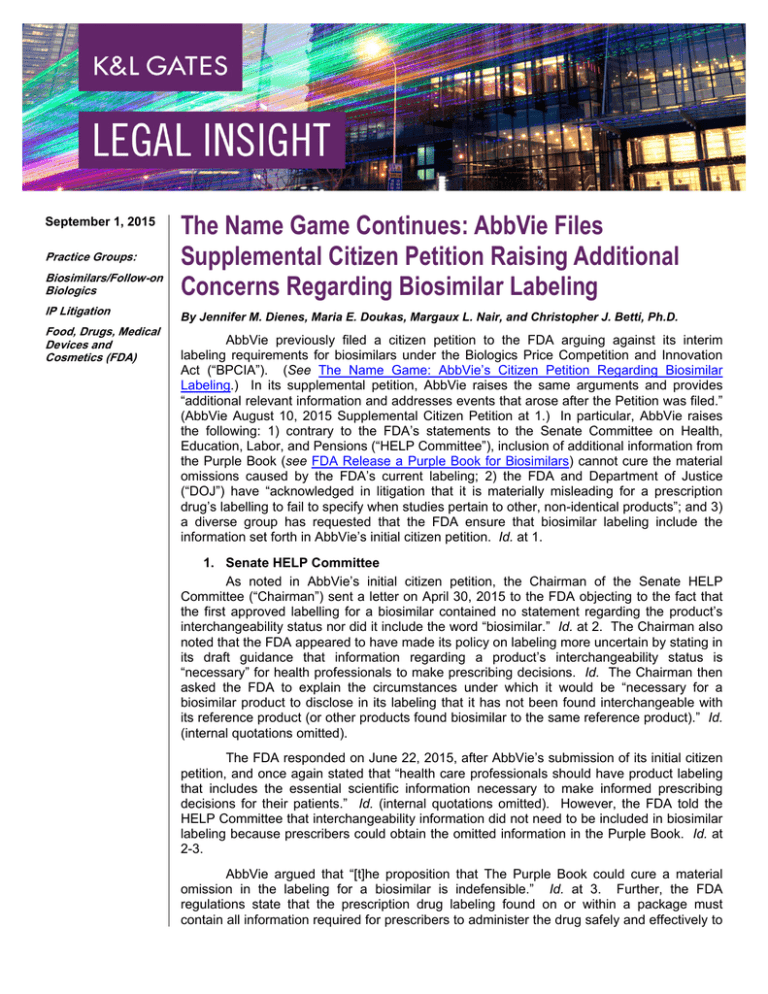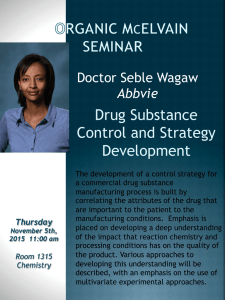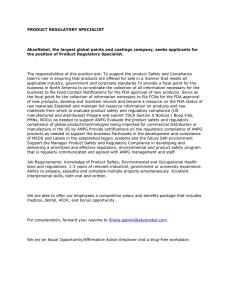
September 1, 2015
Practice Groups:
Biosimilars/Follow-on
Biologics
IP Litigation
Food, Drugs, Medical
Devices and
Cosmetics (FDA)
The Name Game Continues: AbbVie Files
Supplemental Citizen Petition Raising Additional
Concerns Regarding Biosimilar Labeling
By Jennifer M. Dienes, Maria E. Doukas, Margaux L. Nair, and Christopher J. Betti, Ph.D.
AbbVie previously filed a citizen petition to the FDA arguing against its interim
labeling requirements for biosimilars under the Biologics Price Competition and Innovation
Act (“BPCIA”). (See The Name Game: AbbVie’s Citizen Petition Regarding Biosimilar
Labeling.) In its supplemental petition, AbbVie raises the same arguments and provides
“additional relevant information and addresses events that arose after the Petition was filed.”
(AbbVie August 10, 2015 Supplemental Citizen Petition at 1.) In particular, AbbVie raises
the following: 1) contrary to the FDA’s statements to the Senate Committee on Health,
Education, Labor, and Pensions (“HELP Committee”), inclusion of additional information from
the Purple Book (see FDA Release a Purple Book for Biosimilars) cannot cure the material
omissions caused by the FDA’s current labeling; 2) the FDA and Department of Justice
(“DOJ”) have “acknowledged in litigation that it is materially misleading for a prescription
drug’s labelling to fail to specify when studies pertain to other, non-identical products”; and 3)
a diverse group has requested that the FDA ensure that biosimilar labeling include the
information set forth in AbbVie’s initial citizen petition. Id. at 1.
1. Senate HELP Committee
As noted in AbbVie’s initial citizen petition, the Chairman of the Senate HELP
Committee (“Chairman”) sent a letter on April 30, 2015 to the FDA objecting to the fact that
the first approved labelling for a biosimilar contained no statement regarding the product’s
interchangeability status nor did it include the word “biosimilar.” Id. at 2. The Chairman also
noted that the FDA appeared to have made its policy on labeling more uncertain by stating in
its draft guidance that information regarding a product’s interchangeability status is
“necessary” for health professionals to make prescribing decisions. Id. The Chairman then
asked the FDA to explain the circumstances under which it would be “necessary for a
biosimilar product to disclose in its labeling that it has not been found interchangeable with
its reference product (or other products found biosimilar to the same reference product).” Id.
(internal quotations omitted).
The FDA responded on June 22, 2015, after AbbVie’s submission of its initial citizen
petition, and once again stated that “health care professionals should have product labeling
that includes the essential scientific information necessary to make informed prescribing
decisions for their patients.” Id. (internal quotations omitted). However, the FDA told the
HELP Committee that interchangeability information did not need to be included in biosimilar
labeling because prescribers could obtain the omitted information in the Purple Book. Id. at
2-3.
AbbVie argued that “[t]he proposition that The Purple Book could cure a material
omission in the labeling for a biosimilar is indefensible.” Id. at 3. Further, the FDA
regulations state that the prescription drug labeling found on or within a package must
contain all information required for prescribers to administer the drug safely and effectively to
The Name Game Continues: AbbVie Files Supplemental Citizen Petition
Raising Additional Concerns Regarding Biosimilar Labeling
their patients. Id. AbbVie further contended that “[t]his is a foundational principle of FDA
law” that the FDA “fought long and hard to vindicate.” Id. According to AbbVie, the FDA’s
reliance on the Purple Book as an ancillary source of information is “curiously irrational”
where the labeling does not even tell prescribers that the product is a biosimilar. Id. at 4.
AbbVie pointed out that, unlike generic drugs that generally have labeling identical to the
branded drugs, Congress has recognized that biosimilars and branded biologics are not the
same, should not be labeled the same, and should not be substituted unless they are
designated as interchangeable. Id. AbbVie also argued that the Purple Book cannot be
relied upon for “essential prescribing information” because it does not provide the information
the FDA deems as “critical” to support prescribing decisions. Id. at 5.
2. Amarin Pharma, Inc. v. FDA
AbbVie next turned to statements made by the FDA and DOJ in Amarin Pharma, Inc.
v. FDA, No. 15-3588 (S.D.N.Y.). The Director of the Center for Drug Evaluation and
Research filed a letter dated June 5, 2015 with the Court that discussed permissible
In the letter, the FDA recommended that
marketing of the new drug Vascepa®.
communications not imply that studies conducted using products other than Vascepa® were
studies of Vascepa® itself. Id. Further, the FDA recommended express disclosure that such
studies were not of Vascepa® and that the results may not apply to Vascepa®. Id. AbbVie
also noted that in a brief filed on June 23, 2015 by the DOJ on the FDA’s behalf, the DOJ
asserted that it would be “misleading for Amarin to suggest or imply … that studies using
products other thank Vascepa were studies of Vascepa itself.” Id.(quoting FDA, Mem. Of
Law in Opp. To Pls. Mot. For Preliminary Injunction, 23 (June 23, 2015), Dkt. No. 51, in
Amarin Pharma, Inc. v. FDA, No. 15-3588 (S.D.N.Y.).
AbbVie, drawing a parallel between a biosimilar and branded biologic and Vascepa®
and its related products, noted that the FDA approved labeling for Zarxio “relies entirely on
studies involving a different product without acknowledging that the studies were not
conducted with Zarxio.” Id. at 6. AbbVie noted that the FDA and DOJ have represented that
such labeling would be misleading. Id.
3.
Stakeholder Support for Distinct Labeling
Next, AbbVie noted that stakeholder support for distinctive biosimilar labeling is
continuing to grow. Id. AbbVie discussed six examples of stakeholder concern regarding
biosimilar labeling. Id. at 6-7. In all of these examples, concern was expressed regarding
the accuracy of biosimilar labeling, its failure to require the product be labeled as a
biosimilar, and its failure to provide information regarding interchangeability. Id. at 6-8.
AbbVie’s cited examples include the following: an April 23, 2015 letter from leading
pharmacists to the Acting Commissioner of Food and Drugs (“Acting Commissioner”); a May
19, 2015 panel discussion of physicians, advocates, and legislators convened under the
auspices of the Alliance for Patient Access regarding biosimilar issues, including labeling; a
June 9, 2015 letter from the Patients for Biologics Safety and Access to the Acting
Commissioner; a June 12, 2015 letter from the Global Healthy Living Foundation to the
Activing Commissioner; a July 1, 2015 issuance of survey results from the Coalition of State
Rheumatology Organizations’ indicating that 96 percent of the 3,000 rheumatologists
surveyed believed the FDA should require a label that identifies the medication as a
biosimilar and conveys information regarding its differences from the branded biologic; and a
July 9, 2015 statement from the Biosimilars Forum endorsing AbbVie’s petition.
K&L Gates LLP will continue to follow any further developments.
2
The Name Game Continues: AbbVie Files Supplemental Citizen Petition
Raising Additional Concerns Regarding Biosimilar Labeling
Authors:
Jennifer M. Dienes
jennifer.dienes@klgates.com
+1.312.807.4219
Maria E. Doukas
maria.doukas@klgates.com
+1.312.807.4223
Margaux L. Nair
margaux.nair@klgates.com
+1.312.807.4280
Christopher J. Betti, Ph.D.
christopher.betti@klgates.com
+1.312.807.4313
Anchorage Austin Beijing Berlin Boston Brisbane Brussels Charleston Charlotte Chicago Dallas Doha Dubai Fort Worth Frankfurt
Harrisburg Hong Kong Houston London Los Angeles Melbourne Miami Milan Moscow Newark New York Orange County Palo Alto Paris
Perth Pittsburgh Portland Raleigh Research Triangle Park San Francisco São Paulo Seattle Seoul Shanghai Singapore Spokane
Sydney Taipei Tokyo Warsaw Washington, D.C. Wilmington
K&L Gates comprises more than 2,000 lawyers globally who practice in fully integrated offices located on five
continents. The firm represents leading multinational corporations, growth and middle-market companies, capital
markets participants and entrepreneurs in every major industry group as well as public sector entities, educational
institutions, philanthropic organizations and individuals. For more information about K&L Gates or its locations,
practices and registrations, visit www.klgates.com.
This publication is for informational purposes and does not contain or convey legal advice. The information herein should not be used or relied upon in
regard to any particular facts or circumstances without first consulting a lawyer.
© 2015 K&L Gates LLP. All Rights Reserved.
3






